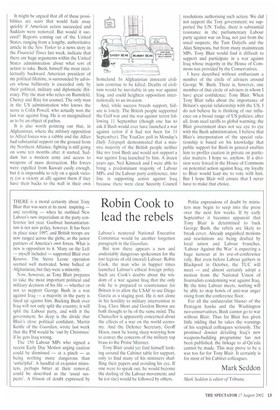Robin Cook to lead the rebels
THERE is a moral certainty about Tony Blair that was seen at its most inspiring — and revolting — when he outlined New Labour's new imperialism at the party conference last year. Gunboat humanitarianism is not new policy, however. It has been in place since 1997, and British troops are now ranged across the globe, as the junior partners of America's own forces. What is new is opposition to it. Many on the Left — myself included — supported Blair over Kosovo. The Sierra Leone operation seemed well motivated. Some balked at Afghanistan, but they were a minority.
Now, however, as Tony Blair prepares to take the most important political and military decision of his life — whether or not to support George Bush in a war against Iraq a majority in the party is lined up against him. Backing Bush over Iraq will not only split the country; it will split the Labour party, and with it the government. So deep is the divide that Blair's close political confidant, Martin Kettle of the Guardian, wrote last week that the PM would be 'out by Christmas' if he gets Iraq wrong.
The 150 Labour MPs who signed a recent Early Day Motion urging caution could be dismissed — at a pinch — as being nothing more dangerous than 'unhelpful'. A handful of ex-junior ministers, perhaps bitter at their removal, could be described as the 'usual suspects'. A frisson of doubt expressed by Labour's neutered National Executive Committee would be another forgotten paragraph in the Guardian.
But now there appears a new and undeniably dangerous spokesman for the lost legions of old (moral) Labour: Robin Cook, the man who in happier times launched Labour's ethical foreign policy. Such are Cook's doubts about the wisdom of a war against Iraq that the only role he is prepared to countenance for Britain is to allow the USAF to use Diego Garcia as a staging post. He is not alone in his hostility to military intervention in Iraq. Clare Short and Gordon Brown are both thought to be of the same mind. The Chancellor is apparently concerned about the effects of a war on the world economy. And the Defence Secretary, Geoff Hoon, must be losing sleep worrying how to convey the concerns of the military top brass to the Prime Minister.
Tony Blair could yet find himself looking around the Cabinet table for support, only to find many of his ministers shuffling their papers and avoiding his eye. If one were to speak out, he would become the darling of the Labour movement; and he (or she) would be followed by others. Polite expressions of doubt by ministers may begin to seep into the press over the next few weeks. If by early September it becomes apparent that Tony Blair is determined to back George Bush, the rebels are likely to break cover. Already anguished motions and resolutions are being drafted by local union and Labour branches. 'Labour Against the War' is expecting a huge turnout at its eve-of-conference rally. But even before Labour gathers in Blackpool in October, the TUC will meet — and almost certainly adopt a motion from the National Union of Journalists condemning war against Iraq. By the time Labour meets, nothing will be able to stop howls of anti-war anger rising from the conference floor.
For all the unilateralist bluster of the Pentagon hawks and the Washington neo-conservatives, Bush cannot go to war without Blair. Thus far Blair has given little inkling that he takes the warnings of his sceptical colleagues seriously. The promised dossier detailing Iraq's new weapons-building programme has not been published, the linkage to al-Qa'eda cannot be made. This may prove to be a war too far for Tony Blair. It certainly is for most of his Cabinet colleagues.
Mark Seddon
Mark Seddon is editor of Tribune.






























































 Previous page
Previous page